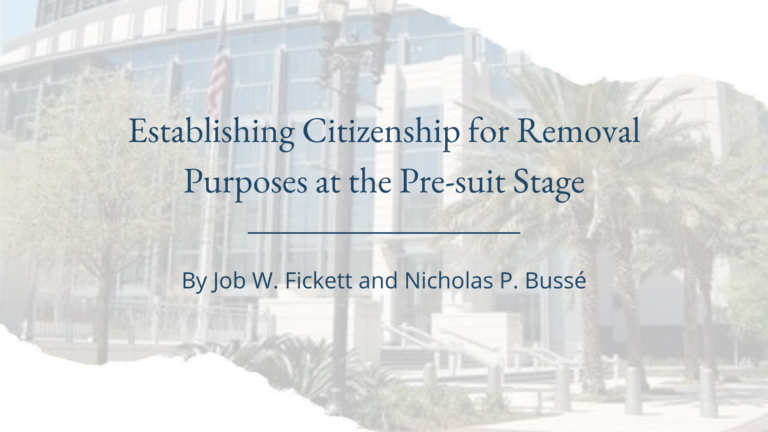More often, insurance companies are asking defense counsel to explore whether removal of uninsured motorist lawsuits to federal court is appropriate when it appears diversity jurisdiction may be applicable. For federal courts to exercise diversity jurisdiction, the amount in controversy must exceed $75,000 and complete diversity of citizenship must exist. The party seeking to invoke removal jurisdiction bears the burden of proving the citizenship of each party to suit. Complete diversity of citizenship occurs when the plaintiff and defendant are domiciled in the different states.
The question of “citizenship” is not resolved merely by a plaintiff residing in the same state for an extended period, but instead requires a fact-based inquiry of the whether the current state of residence is the plaintiff’s domicile, or “the place where a person has physically lived, regards as home, and intends to remain or return even if currently residing elsewhere.” This distinction between domicile and mere residency will mean the difference between the federal court rejecting or accepting removal jurisdiction.
When there is a potential uninsured motorist suit coming down the pike (in the form of a Civil Remedies Notice for counsel to respond to), it is likely that defense counsel will conduct an Examination Under Oath (EUO) at the pre-litigation stage. At that time, defense counsel has an opportunity to inquire about the plaintiff’s intent to remain in their residence and establish evidence of citizenship. Gathering this valuable evidence to include in a notice of removal to federal court will satisfy the court’s initial citizenship inquiries without necessitating additional briefing or leaving the door open for a challenge to remand the case back to state court.
Defense counsel should implement the following during their standard questioning at an EUO:
- Ask the Plaintiff how long they have been at their current address and get as definitive an answer as possible.
- Then, ask “Do you have any intention or plans to move?” If they say yes, ask if they plan to move out of state. If they answer yes, ask them when and pry on how solid their plans are.
- Ask them if they are registered to vote in their current state.
- Attach their driver’s license as an exhibit to the EUO transcript.
- Ask them if most or all of their doctors are local or located within the state.
- Ask them if their employer has any plans to relocate them to another state, and if so, whether they would accept the relocation.
Establishing the facts regarding a plaintiff’s citizenship during this early opportunity will streamline your notices of removal when the circumstances are appropriate.

